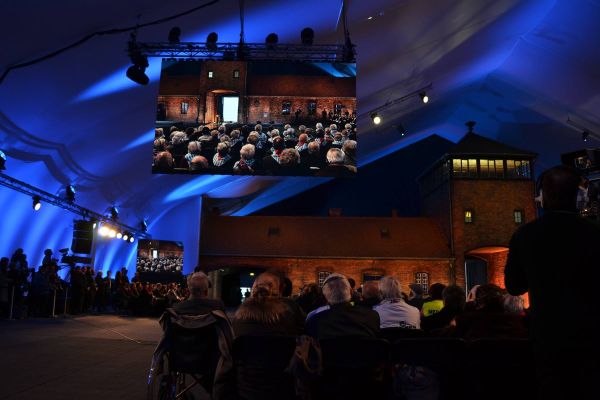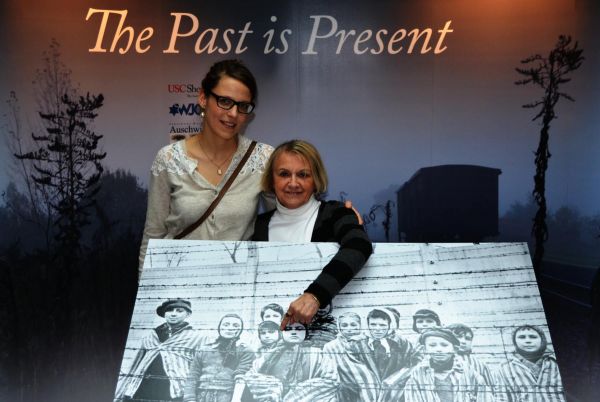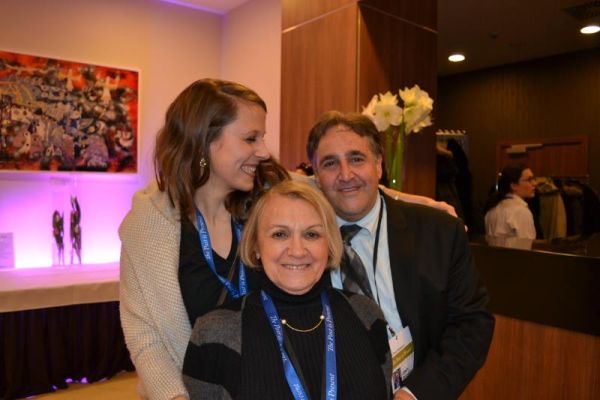Three wishes and an unexpected gift on Holocaust Remembrance Day
For a German like myself, International Holocaust Remembrance Day is a day that is both intensely private and profoundly public.

Seventy-two years ago, on January 27, 1945, Soviet troops liberated what has entered the history books as perhaps the most brutal site of human mass destruction: Auschwitz-Birkenau. Two years ago, I had the honor of being the personal companion at the Commemoration of the 70th Anniversary of the Liberation of Auschwitz for one of the comparatively few to survive the horrors of this death machinery, my deeply loved friend Paula Lebovics. Needless to say, it was an emotionally intense few days we spent with the 99 other survivors and their companions, usually spouses, children and grandchildren, who had also traveled to Poland to attend the commemoration.
During those precious days, the survivors’ voices, their faces, tears, words, bravery, memories, silences and smiles have deeply etched themselves into my heart in a way I struggle to convey, in a way I never want to let go of, in a way I will be grateful for until my last breath. Together, they have shaped the way in which I look at images of sinking boats in the Mediterranean today, boats crammed with people, their eyes filled with the darkness of desperation as they are trying to reach a safe shore. They have shaped the way in which I look at my country celebrating the fall of the Berlin wall with deafening fireworks, whilst silently investing billions in the shielding of Europe's outer borders. They have shaped the way in which I look at walls – those already built and those yet to be built – that curb people's freedom and divide rather than unite people as members of our shared human species. They have made me wary of the omnipresent rhetoric pursued by some of those who are supposed to lead us, a rhetoric that only guides us to fear and distrust one another and almost invariably leads to exclusion, division and destruction.

Seemingly utterly unrelated, after weeks of eager waiting, on this year's Holocaust Remembrance Day a parcel for our daughter finally arrived from the United States with a cuddly toy dog in it. It's a belated Christmas gift for her by one of my dearest Jewish friends, Josh Grossberg, who works for USC Shoah Foundation and who was also at the commemoration in Auschwitz two years ago. Along with the dog came a birth certificate for the receiving child to fill in the date of birth and name of his or her new toy. I watched my daughter carefully fill in the certificate. Lucy is the lucky dog's name. Her birthday? January 27, 2017. Naturally.
For a second, I had to close my eyes at the beauty of it. Seeing my daughter smile such a happy smile, a smile caused by someone whom my grandparent's generation would have wanted dead, someone who belongs to a group whose entire existence, familial ties, cultural bonds and memories they sought to destroy in such perverted perfection – seeing that filled me with a sense of happiness so profound I have experienced rarely before. For a brief moment in history, it felt to me as if everything was right.

Over the past weeks, the ongoing debate around Germany's memory culture has rekindled. The question if we, the German people, have finally remembered enough is the most reverberating one. Sadly, it is a debate that not only implies that there is some kind of expiration date to remembering, but, perhaps more significantly, a debate that suggests that it is up to the former perpetrator state to dictate the terms of memory.
On this Holocaust Remembrance Day, this historic day that now coincides with little Lucy's birthday, I made three wishes:
- May we remember the past for as long as those who have suffered, their children, and their children's children need us by their side to carry with them the suffocating weight of the painful memories that bind us together.
- May these memories of the past guide our actions in the present. Always. Relentlessly. Beautifully.
- May these actions lead to a future filled with tenderness, humility, deep understanding and caring toward our fellow human beings.
To those of us who were born long after Auschwitz, yet who continue to feel deeply entangled in the atrocious deeds of those before us – let us understand the voices of the past not as a burden, but as a gift tenderly held out to us by those who suffered at the hands of our ancestors, a gift bestowing upon us not the personal guilt of past shame, but the responsibility to sculpt future beauty in the present.